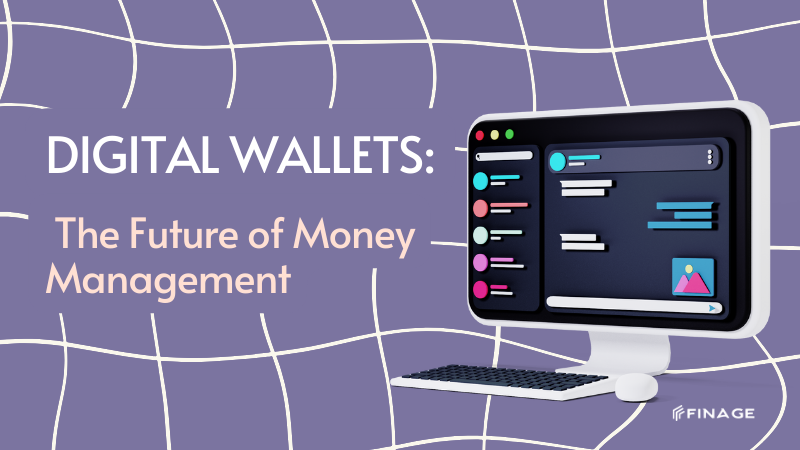Digital Wallets: The Future of Money Management
5 min read • January 20, 2024

Introduction
The emergence of digital wallets has fundamentally transformed how individuals manage their finances in today's digital age. These innovative platforms serve as virtual counterparts to physical wallets, allowing users to store, organize, and transact money electronically. Digital wallets streamline financial management by offering a convenient and secure way to access various payment methods, store multiple cards, and conduct transactions seamlessly through a smartphone or other digital devices. Their versatility extends beyond basic transactions, encompassing functionalities like peer-to-peer payments, bill splitting, and even integration with loyalty programs, further enhancing user convenience.
The impact of digital wallets on financial transactions is substantial, as they pave the way for a cashless society. With the growing prevalence of digital payments, these platforms are revolutionizing traditional payment methods, reducing reliance on physical cash, and enhancing financial inclusivity by offering services to unbanked or underbanked populations. Moreover, digital wallets incorporate robust security features such as encryption and biometric authentication, bolstering trust among users and mitigating concerns regarding online transactions. Their widespread adoption is reshaping consumer behavior, influencing businesses to adapt to this evolving landscape by integrating digital wallet options into their payment systems.
As the digital economy continues to evolve, digital wallets are positioned to play a pivotal role in shaping the future of money management. Their ongoing development involves advancements in technology, such as the integration of blockchain and cryptocurrency, further diversifying the scope of financial services offered within these platforms. The convenience, accessibility, and potential for innovation that digital wallets present indicate a shift towards a more interconnected and efficient financial ecosystem, where managing money becomes increasingly seamless and adaptable to individual preferences and lifestyles.
Table of Contents
- Understanding Digital Wallets
- Definition and Functionality
- Types of Digital Wallets
- Advantages of Using Digital Wallets
- Convenience and Efficiency
- Enhanced Security Features
- Integration with Financial Services
- The Rise of Mobile Payments
- Smartphone Penetration and Mobile Wallets
- Impact on Retail and E-commerce
- Digital Wallets and Cryptocurrencies
- Storing and Transacting in Cryptocurrencies
- The Convergence of Traditional and Digital Finance
- Challenges and Limitations
- Security Concerns
- Digital Divide and Accessibility
- Regulatory Environment
- Compliance with Financial Regulations
- Evolving Legal Frameworks
- Future Trends in Digital Wallets
- The Role of AI and Machine Learning
- Expanding Scope of Services
- Conclusion
- References
Understanding Digital Wallets
Definition and Functionality
Digital wallets are electronic devices or online services that allow individuals to make electronic transactions, including buying items online or in person using a computer or smartphone.
Types of Digital Wallets
There are various types of digital wallets, including online wallets, mobile wallets, and cryptocurrency wallets, each serving different needs and purposes.
Advantages of Using Digital Wallets
Convenience and Efficiency
Digital wallets offer unparalleled convenience by enabling fast and easy transactions, often completed with just a tap or a click.
Enhanced Security Features
They often employ advanced security measures such as encryption, two-factor authentication, and biometric verification to protect user funds and information.
Integration with Financial Services
Many digital wallets are integrated with a range of financial services, providing users with a comprehensive money management tool.
The Rise of Mobile Payments
Smartphone Penetration and Mobile Wallets
The widespread adoption of smartphones has been a major driver in the growth of mobile wallets, making digital payments accessible to a vast user base.
Impact on Retail and E-commerce
Digital wallets have transformed retail and e-commerce, offering consumers a more streamlined and seamless shopping experience.
Digital Wallets and Cryptocurrencies
Storing and Transacting in Cryptocurrencies
Some digital wallets are designed to store and manage cryptocurrencies, facilitating easy and secure transactions in the digital currency space.
The Convergence of Traditional and Digital Finance
The integration of cryptocurrencies into digital wallets represents a convergence of traditional finance with the emerging digital economy.
Challenges and Limitations
Security Concerns
While digital wallets offer enhanced security features, they are not immune to cyber threats, necessitating continuous advancements in security technologies.
Digital Divide and Accessibility
The reliance on digital technology means that those without access to smartphones or the internet may be excluded from using digital wallets.
Regulatory Environment
Compliance with Financial Regulations
Digital wallet providers must navigate a complex regulatory environment, ensuring compliance with laws and regulations across different jurisdictions.
Evolving Legal Frameworks
The legal frameworks governing digital wallets and electronic payments are continually evolving, posing a challenge for wallet providers and users.
Future Trends in Digital Wallets
The Role of AI and Machine Learning
Artificial intelligence and machine learning are expected to play a significant role in the future development of digital wallets, particularly in enhancing security and personalizing user experiences.
Expanding Scope of Services
The scope of services offered by digital wallets is likely to expand further, potentially including features like investment management, insurance services, and more.
Conclusion
Digital wallets signify a groundbreaking leap forward in the management and utilization of finances, amalgamating convenience, security, and innovation into a single platform. Their advent has redefined the dynamics of monetary transactions by providing users with a seamless and efficient means to store, transfer, and spend money digitally. As technological advancements persist, digital wallets are poised to transition from a novel convenience to an indispensable component of our financial routines, poised to reshape how we perceive and handle money.
The allure of digital wallets lies in their ability to simplify financial interactions, offering users a secure and user-friendly method to conduct transactions, manage funds, and access a range of financial services. Their versatile nature caters to various payment preferences, enabling seamless transactions online, in-store, and across borders. As technology continues to evolve at a rapid pace, the trajectory of digital wallets points towards deeper integration into our daily financial activities. These wallets are not merely a fleeting trend but are anticipated to become a cornerstone of modern finance, potentially replacing physical wallets and fundamentally altering the landscape of money management. Their continued evolution promises a future where financial interactions are streamlined, secure, and effortlessly woven into our digital lives.
You can get your Real-Time and Historical Cryptocurrency Data with a free Crypto Data API key.
Build with us today!
Claim Your Free API Key Today
Access stock, forex and crypto market data with a free API key—no credit card required.

Stay Informed, Stay Ahead
Finage Blog: Data-Driven Insights & Ideas
Discover company news, announcements, updates, guides and more


